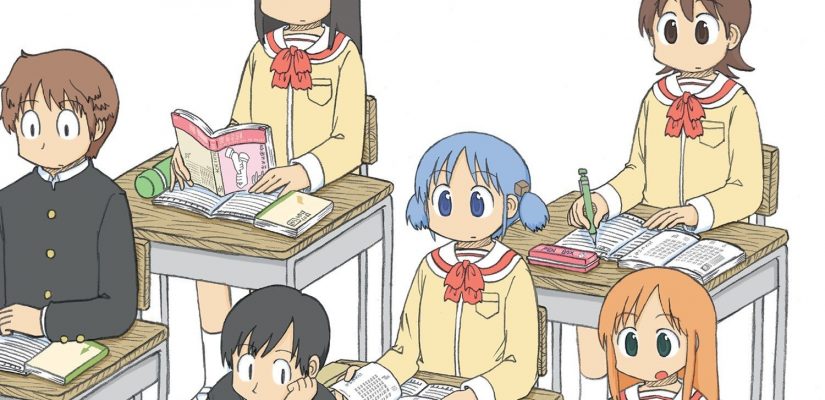
A review of the comedy manga Nichijou: My Ordinary Life by Arawi Keiichi has been long overdue. I’ve referenced the series off and on since 2011 when the anime debuted, but it’s only in the past year that I finally completed my Nichijou manga collection. Thus, while it’s a few years later than I would’ve preferred, I’m here to lay down my final verdict:
It’s so goddamn funny.
Well, that took a load off. Until next time!
In all seriousness, reading through all of Nichijou had me laughing uncontrollably on multiple occasions, interspersed between joyful chuckles and lip-puckering smiles. Plenty of anime and manga are wacky, subdued, over-the-top, subversive, and heartful, but rarely do they find themselves packaged in such a perfect package. The main joke of the series is its title—the series is indeed the exploration of the everyday lives of its characters, but their personalities, experiences, and interactions are simultaneously so mundane and bizarre that they play with your expectations at all turns. When you expect them to go zany, you’re hit with a reality check. When you expect something subtle, they might deliver something so hyper-subtle that it loops back around to absurd.
The core characters of Nichijou come in two groups. The first is a trio of high school friends: the energetic but somewhat dim Yuuko, the powerful closet fujoshi Mio, and the intelligent master troll Mai. The second is a robot named Nano who wishes to have the conspicuous wind-up key removed from her back so she can better pass for a normal girl, and her creator, a child genius called “Professor” who is as immature as she is brilliant. In both cases, the bonds between these characters are equal parts caring support and mind-bending frustration, and it only gets more extreme in both respects as the series continues.
About the closest thing that comes to mind in terms of humor is actually the old webcomic Perry Bible Fellowship in the way that both series are capable of delivering humor and anti-humor with laser-like precision, and you don’t necessarily know which one you’re going to get. One big difference with Nichijou is that it tries to build a fairly consistent world for its comedy to build upon, and this only gets more elaborate as the series goes on. Three of my favorite examples are as follows:
- There’s a dog who shows up whenever someone is in a sorry situation whose only purpose is to lay its paw on the hapless individual as a show of pity. At some point during the series, it’s revealed that the dog doesn’t show up out of nowhere—it has an owner who is always extremely confused whenever his pet seems to suddenly start running away with a sense of purpose.
- Mio’s sister, Yoshino, and Mai are both known for their pranks. For most of the series, they don’t really interact, and their forms of humor are similar yet different—Yoshino’s trolling is all about teasing, whereas Mai’s is about defying expectations. Their jokes sometimes cross paths, such as when an attempt to share sides for lunch results in a “Sucks to be you!” sign in Mio’s bentou, and Mai reveals her bentou container to have nothing more than a pre-packaged energy jelly drink (which she then starts to squeeze onto Yuuko’s rice). When Yoshino and Mai finally interact for an extended period, it’s like a glorious clash of the titans.
- One of the side characters in the story invents a fake sport named go/soccer so he can start a club and slack off in its clubroom. However, he later discovers that go/soccer actually exists (thanks to a new student who was his middle school’s MVP), and that one of the high school’s teachers was a champion back in his youth. But rather than go/soccer being something in the vein of chess boxing—a combination sport that involves taking alternating rounds between the chess and boxing—go/soccer is completely inscrutable in every facet imaginable, like a serious version of Calvinball from Calvin & Hobbes.
One last thing worth talking about is how the manga compares to the anime that introduced so many (including myself) to Nichijou. There are the more obvious things: the manga continues past where the anime left off, and some of the jokes in the anime come from another series by the author: Helvetica Standard. The most major change, however, comes from the fact that the Nichijou anime was done by Kyoto Animation, whose excellent animation is gorgeous and polished in just about every scene. Ironically, that can sometimes work against the humor of the series, and this can be seen in moments of the manga where the slightly crude art style makes the same joke three times funnier. That being said, I hope that KyoAni can someday come back to animate the rest, despite the tragic setback they’ve faced.
Nichijou: My Ordinary Life is only 10 volumes long, and it’s so very worth reading. I know I’m extremely late in getting this review out, and that it might be a distant memory for many anime and manga fans, but for those who have yet to discover this magnificent gut-busting manga, there’s a real gem waiting.








